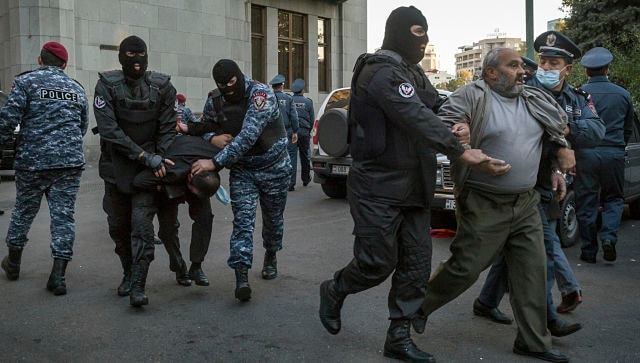After warfare between Armenia and Azerbaijan, peace sees winners and losers swap locations
Armenians and Azerbaijanis lived facet by facet when each nations had been a part of the Soviet Union, however century-old ethnic enmity reignited when communism collapsed
Kelbajar, Azerbaijan: The vehicles, vehicles and vans jamming the mountain roads deep into the evening Saturday brimmed with all of the possessions that the fleeing Armenians may rescue: upholstered furnishings, livestock, glass doorways.
As they left, many set their houses on hearth, enveloping their exodus in acrid smoke and illuminating it in an orange glow. Close to a number of the burning homes stood older ruins: the stays of houses deserted a quarter-century in the past, when Azerbaijanis fled and Armenians moved into the area.
Within the southern Caucasus Mountains on the border of Europe and Asia, this weekend was a turning level in a decades-long battle between Armenia and Azerbaijan over remoted and mountainous lands that each side believed rightfully had been theirs. Again within the Nineteen Nineties, it was the Azerbaijanis who had been pressured to depart. Now, it’s the Armenians, a renewed tragedy for them and a triumph for his or her foes.
Underneath a Russia-brokered peace deal ending a six-week warfare that killed 1000’s, Azerbaijan on Sunday was set to take management of a swath of the breakaway, ethnic Armenian area of Nagorno-Karabakh, which is a part of Azerbaijan below worldwide regulation.
“How can I burn this?” mentioned Ashot Khanesyan, a 53-year-old Armenian, referring to the house he had constructed and was about to abandon within the city of Kelbajar. His neighbours had urged him to destroy the home, he mentioned, however, “My conscience received’t let me.”
He was packing his chickens, tying up their toes with white string, however he mentioned he would go away his potatoes behind.
The New York Instances got here to Armenian-controlled areas and to Baku, Azerbaijan’s capital, to doc this pivotal second for each side within the battle. The warfare has drawn in a number of the area’s greatest worldwide powers, with Turkey backing Azerbaijan and Russia struggling to cease the combating in a area it as soon as dominated.
Russian peacekeeping troops, overseeing the handover, rumbled into the district of Kelbajar on Friday aboard armoured personnel carriers. They arrange one among their statement posts at Dadivank, a centuries-old monastery that Armenians, who’re primarily Christian, concern the arrival Azerbaijanis, who’re primarily Muslim, will deface.
“When an Armenian is born, all of them find out about Artsakh,” mentioned Vergine Vartanyan, 24, in tears, utilizing the Armenian time period for Nagorno-Karabakh.
Together with a whole lot of different Armenians, she prayed at Dadivank for what may very well be the final time Friday, to bid farewell.
The distinction with the scenes in Baku, the capital of Azerbaijan, may hardly be sharper. There, celebratory flags graced nearly each floor, hanging from balconies, draped over automobile roofs and home windows and wrapped across the shoulders of a youngster on the Martyrs’ Alley cemetery on a hillside overlooking the Caspian Sea.
A lot of Azerbaijan exploded in joyous celebration within the streets Tuesday after President Ilham Aliyev introduced within the early hours of the morning that the warfare was over and that Armenian forces would withdraw from three districts adjoining to Nagorno-Karabakh and return them to Azerbaijani management.
“We’re so glad as a result of we lastly received, thank God,” mentioned Ibrahim Ibrahimov, 18, a pc science scholar strolling with two associates close to the seafront in Baku. “Lastly, the folks of Karabakh can go dwelling.”
Armenians and Azerbaijanis lived facet by facet when each nations had been a part of the Soviet Union, however century-old ethnic enmity reignited when communism collapsed. Nagorno-Karabakh, primarily ethnic Armenian, ended up as a part of Azerbaijan. Armenia received a warfare over the territory within the early Nineteen Nineties that killed some 20,000 folks and displaced 1,000,000, largely Azerbaijanis.
Azerbaijanis had been expelled not solely from Nagorno-Karabakh itself but additionally from seven surrounding districts, together with Kelbajar, that had been largely inhabited by Azerbaijanis. The complete area grew to become the internationally unrecognized, ethnic Armenian Nagorno-Karabakh Republic. Azerbaijan’s want to return its residents who had been displaced from their houses grew to become a driving pressure in its politics.
1 / 4-century of on-and-off talks did not resolve the standoff, and on 27 September, President Ilham Aliyev of Azerbaijan launched an offensive to retake the territory by pressure. Superior drones, funded by Azerbaijan’s oil and fuel growth, pounded the Armenians of their trenches. No less than 2,317 Armenian troopers died; Azerbaijan has not launched a dying toll.
As Azerbaijan’s forces in early November approached the fortress metropolis of Shusha — a spot steeped in historical past and symbolism for each nations — Azerbaijanis barely slept, watching the state tv channel for information.
“We had been all crying,” mentioned Teymur, 37, recalling the second when Aliyev introduced that Azerbaijan had taken Shusha.
He mentioned he had watched the announcement along with his aunt of their one-room condominium, as neighbours poured in to congratulate. Lots of them, like his household, are from Shusha. He requested that his surname to not be revealed to protect the household’s privateness.
“It’s the finish of longing and residing unhealthy occasions,” he mentioned. “If you find yourself a displaced individual, and when you find yourself eager for that place and you can not go to it, that place turns into greater than only a stone or mountain, it turns into like a beloved individual. You wish to kiss it, and lie down on it and really feel the vitality from the earth.”
Almost 1,000,000 folks had been uprooted by the primary warfare between the 2 within the Nineteen Nineties and had been resettled in cities and settlements throughout Azerbaijan. Most of the households nonetheless dwell in cramped residences in and round Baku, and their happiness on the promise of return was tempered with grief.
“We’re so glad, however lots of our younger died in that place,” Elnare Mamedova, 48, mentioned of the latest combating in and round Nagorno-Karabakh. “All of the our bodies are coming again now.”
She opened {a photograph} on her telephone of her neighbour’s son, a soldier within the hospital with a bullet wound to the pinnacle.
“He’s been in a coma for 40 days,” she mentioned.
One other neighbour’s son was lacking, she mentioned.
“We don’t know the place he’s,” Mamedova mentioned. “Perhaps he’s captured.”
It was removed from clear when displaced Azerbaijanis would be capable to return. Aliyev has promised to rebuild infrastructure and to rid the area of land mines earlier than permitting households to maneuver again.

Azeris have a good time one week after a peace deal over the disputed Nagorno Karabakh territory in Baku, Azerbaijan. By Ivor Prickett © 2020 The New York Instances
On Saturday, within the hectic hours earlier than they thought Azerbaijan was set to take management of the Kelbajar district (the deadline to depart was prolonged for 10 days Sunday), the departing Armenians appeared decided to make resettling the world as troublesome as doable. They knocked down energy strains and disassembled eating places and fuel stations. Males with chain saws fanned out throughout the roadside, stuffing freshly reduce logs into vans and truck beds.
“Allow them to die from the chilly,” mentioned one man, who had arrived from Armenia, amassing the logs.
In a financial institution in Kelbajar on Friday, an worker was breaking down the inside partitions with a big mallet, whereas employees carried the whole lot that moved — home windows, desks, doorways — right into a truck. On the police station, officers had been having a farewell bottle of vodka, whereas a three-foot-tall white cone of burning paperwork smouldered within the again.
“These had been at all times Armenian lands!” one police officer yelled when requested who had lived in Kelbajar earlier than.
One of many few folks staying within the Kelbajar district was Hovhannes Hovhannisyan, the abbott of the Dadivank monastery. When he arrived with the Armenian troopers who took management of the world in 1993, they discovered that the swish mountainside monastery had been transformed to a cattle yard, he mentioned.
Lots of of Armenians crowded the monastery grounds Friday for one final prayer; many introduced their kids to be baptised. A number of the monastery’s distinctive, carved-stone steles, often called khachkars, had been set on picket pallets, apparently to be eliminated. Instantly, down beneath, the monastery guard’s dwelling burst into flames.
“I advised him to not contact it!” Hovhannisyan exclaimed, referring to the guard, who had apparently ignored his entreaty.
In Yerevan, the capital of Armenia, tensions ran excessive in latest days as protesters accused Prime Minister Nikol Pashinyan of treason for acceding to the peace deal. Pashinyan and protection officers mentioned that Armenia, outmatched on the battlefield, had no alternative — a press release that got here as a shock to a rustic, and a worldwide diaspora, that had united in patriotic help of the warfare effort.
“They mentioned we had been successful, we had been successful, after which all of the sudden it turned out we weren’t successful,” mentioned Karine Terteryan, 43, crying subsequent to the opera home in central Yerevan after cops in balaclavas detained scores of protesters. “That is treason.”
On the central Republic Sq. in Yerevan, a large display broadcast cellphone movies shot by Armenian troopers. One threatened vengeance in opposition to Azerbaijanis.
“For each damaged window, for each damaged home, we are going to enter your houses,” the soldier mentioned, his voice echoing throughout the sq.. “You received’t be capable to sleep calmly.”
Almost 2,000 Russian forces will patrol the road between Azerbaijani- and Armenian-controlled areas for not less than 5 years, below the deal brokered by President Vladimir Putin final week. The deal reasserted Russian affect within the previously Soviet southern Caucasus, and the Russians’ arrival was largely welcomed by these ethnic Armenians who mentioned they deliberate to remain within the part of Nagorno-Karabakh that is still below Armenian management.
However even amid the heartbreak, some older Armenians recalled wistfully the times after they lived with Azerbaijanis as associates and neighbors — a nonetheless comparatively latest previous now unimaginable to think about for youthful generations. Igor Badalyan, 53, an Armenian who fled his hometown, Baku, a quarter-century in the past, mentioned it was politicians, not common folks, who had been responsible for the battle.
“The folks battle one another like canines baited in opposition to one another,” he mentioned, visiting Dadivank on Friday along with his spouse and amassing stones and earth in farewell. “It’s unhappy that it occurred this manner. We didn’t need it to be this manner.”
Anton Troianovski and Carlotta Gall c.2020 The New York Instances Firm
Discover newest and upcoming tech devices on-line on Tech2 Devices. Get know-how information, devices opinions & rankings. Widespread devices together with laptop computer, pill and cell specs, options, costs, comparability.
#warfare #Armenia #Azerbaijan #peace #sees #winners #losers #swap #locations











